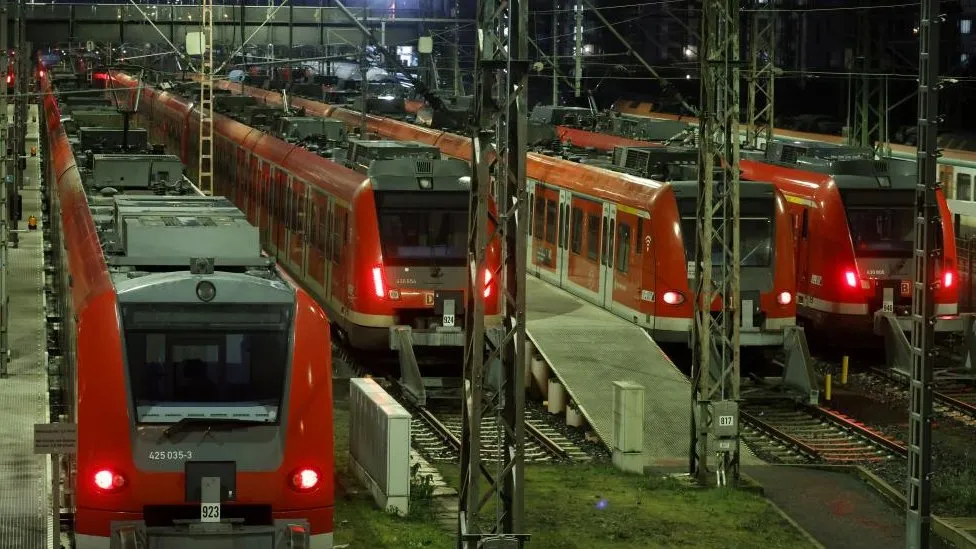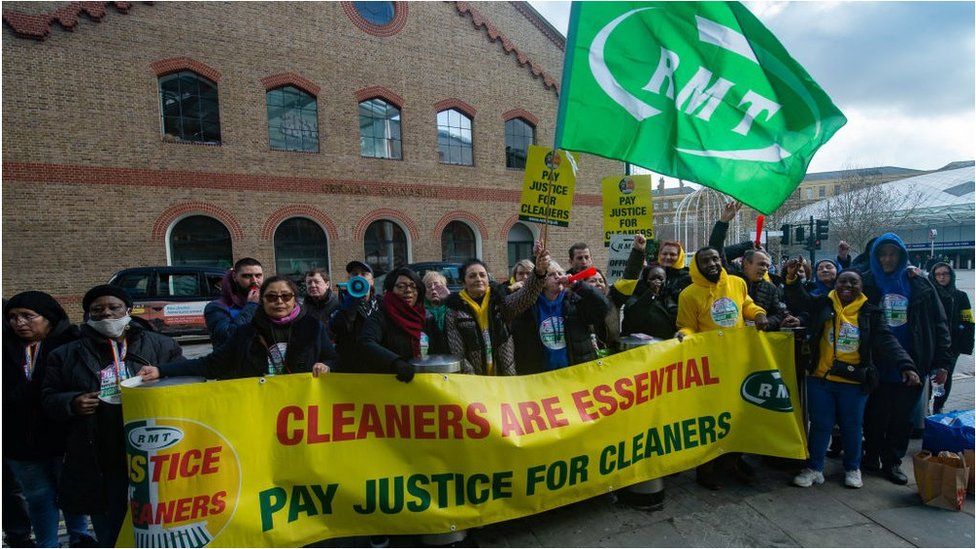Train drivers all over Germany have started a strike. It will go on for six days, which is the longest strike they have ever had.
The GDL rail drivers’ union went on strike, which affected passenger trains starting at 02:00 on Wednesday. Goods-train drivers also took part in the strike.
Many Germans were involved in the situation when the union made a long-standing disagreement with state-owned Deutsche Bahn worse.
The most recent attack is the fourth time they have taken action since November.
The union wants to get paid more because the cost of things is going up. They also want to work fewer hours each week without getting less money.
Deutsche Bahn (DB) has changed their train schedule because of the strike. They will go back to the normal schedule at 6:00 PM on Monday.
Germany’s trains are not running, and it’s never happened before. Passenger trains have been stopped for 136 hours. Train services will be affected by the strike on a weekend for the first time.
There were really bad traffic jams in cities like Hamburg because of a farmers’ protest with 100 tractors. Drivers were getting ready to deal with it.
Local and suburban train services were significantly impacted, and 80% of long-distance trains were cancelled.
The company that runs the trains and government leaders are unhappy about the long strikes because they are causing problems for the German economy and people who need to travel.
Tanja Gönner, who is in charge of a group of German businesses, said that a six-day strike could cost the economy up to €1bn. Germany is an important place for moving goods around Europe.
Transport Minister Volker Wissing asked the union to try to work things out with the help of a mediator. He said that right now, it’s unlikely that a solution will be found.
“Passengers are really worried right now, and no one is talking about a solution,” he told Deutschlandfunk radio.
“If people can’t talk to each other, we really need someone to help them figure things out. ”
A survey by YouGov asked over 4,000 adults in Germany about a strike. They found that only 34% understood why the strike was happening, while 59% said they didn’t understand it at all.
Discussions between the union and DB have been going on since November, but the company said no to the request for a three-hour shorter work week. Instead, they suggested an optional plan where employees could work one hour less without a pay cut or choose to get a 2. 7% pay raise
The GDL said no to the offer.
Tag: Train drivers
-

German train drivers go on longest walkout in history
-
Train drivers from 12 different companies will strike again later this month
The announcement of another train driver strike comes on the same day that London Underground workers go on strike, rendering large sections of the Tube network inoperable.
Train drivers in England have declared a new strike in their long-running pay and conditions dispute.
After months of walkouts by various groups, members of the Aslef union will strike on Saturday, November 26th, causing even more disruption for passengers.
The 12 companies involved are Avanti West Coast; Chiltern Railways; CrossCountry; East Midlands Railway; Great Western Railway; Greater Anglia; London North Eastern Railway; London Overground; Northern Trains; Southeastern; Transpennine Express, and West Midlands Trains.
The rail network has been crippled by strikes as workers fight for inflation-busting pay rises amid the cost of living crisis.
Strikes on 5, 7 and 9 November were called off, but at too short notice to reinstate services, leaving Bonfire Night travellers stuck.
Today, members of Unite and the Rail, Maritime and Transport (RMT) union have walked out over jobs and pensions.
It means no services on large parts of the London Underground.
Only the Central, Northern, District, Elizabeth, Overground and DLR lines are running, but with reduced services.
Train companies with big profits should make ‘proper pay offer’
Aslef general secretary Mick Whelan said of the latest industrial action: “We don’t want to be taking this action.
“We have come to the table, as we always will, in good faith but while the industry continues to make no offer – due to the dodgy deal they signed with the Department for Transport – we have no choice but to take strike action again.
“They want drivers to take a real terms pay cut.
“With inflation now well into double figures, train drivers who kept Britain moving through the pandemic are now being expected to work just as hard this year as last year but for less. Most of these drivers have not had an increase in salary since 2019.
“We want the companies – which are making huge profits – to make a proper pay offer so that our members can keep up with the cost of living.”
-
Train strike: How much are rail workers paid?
Tens of thousands of rail workers are taking part in the biggest strike for decades. The industrial action by members of the RMT union is over pay and redundancies.
The RMT says it wants a pay rise to match the cost of living and has called an offer of 2% – with the possibility of another 1% – “unacceptable”.
- Which lines are affected by the rail strike?
There have been lots of claims about how much rail workers are paid. Let’s start with the highest figure quoted.
How much are train drivers paid?
In a debate about the strikes in Parliament on 15 June, Transport Secretary Grant Shapps said: “The median salary for a train driver is £59,000, compared with £31,000 for a nurse and £21,000 for a care worker.”
To work out the median salary, if you put all train drivers in a row in order of their pay, the person in the middle of the row would be earning the median.
Mr Shapps is mostly right on these figures, which come from the Office for National Statistics (ONS).
For 2021, the median salary for train and tram drivers was £59,189 and for nurses it was £31,093.
His figure for care workers is a bit high. The median for care workers and home carers was £16,502 and for senior care workers it was £20,105.
The trouble with using the figure for train drivers in a debate about the RMT strikes is that the drivers are represented by their own union, Aslef – which is not taking part in the national strike.
Aslef says it represents 96% of train drivers – most of the remaining 4% are not union members at all.
Aslef drivers are set to strike on Greater Anglia services on 23 June. It is also balloting for action on several other lines.
Is the median salary for rail workers £44,000?
Mr Shapps went on to say: “The median salary for the rail sector is £44,000, which is significantly above the median salary in the country.”
We asked the Department for Transport (DfT) how it got to this figure and it initially said it had taken the median figures from the ONS for four categories of workers, added them up and divided by four:
- Rail travel assistants – £33,310 – includes ticket collectors, guards and information staff
- Rail construction and maintenance operatives – £34,998 – they lay and repair tracks
- Rail transport operatives – £48,750 – includes signallers and drivers’ assistants
- Train and tram drivers – £59,189
This wouldn’t have produced a median figure and the DfT subsequently got in touch to say they had actually got the figure from the ONS, which had produced a genuine median figure (£43,747) across everybody in those four categories, along with a fifth – workers who build and repair engines and carriages (their median salary is £46,753).
It has also produced a median figure excluding train drivers – who are not involved in the RMT strike – of £36,800.

Mr Shapps is right that the figure is above the median pay for all employees in the UK, which was £25,971 last year.
The RMT figure of £33,000
The RMT union says the figures used by the government are too high because they include train drivers who are almost all represented by a different union and not people like cleaners who are not categorised in the ONS figures as rail workers.
The RMT says 10,000 of its members are cleaners.
It says that if you take the £44,000 figure, exclude the drivers and include cleaning staff you get a median figure of £33,000, which better reflects the pay of the people going on strike.
A median figure of £31,000 has also been cited by RMT general secretary Mick Lynch.
We asked the union for its exact workings and which is the correct figure, but have not received a response.
It’s hard to judge the figures without that information. We know from the ONS that excluding the drivers brings the figure down to £36,800 and adding a number of lower-paid staff such as cleaners to the calculation would certainly produce a lower figure.
Has pay gone up by 40%?
Speaking about pay for rail workers, Mr Shapps said there had been a “nearly 40% increase in salaries over the last 10 years”.
The ONS calculated a median figure for those same five categories of rail workers in 2011, which came out at £35,329. In 2021 the figure was £43,747.
That means there was an increase of 24% over the last 10 years, not 40%. It’s similar to the 23% increase for all employees over the same period. Inflation over that decade was about 20%.
Remember that for the people actually involved in this week’s strike the increase will be lower, because this figure includes a 39% increase in pay for the train drivers, who are largely not represented by the RMT.
Source: BBC
-
Train drivers set to resume strikes in October
Train drivers are set to stage more strikes in October as part of a long-running dispute over pay, the BBC understands.
Drivers at 12 train companies are expected to strike on 1 and 5 October.
Aslef, the train drivers’ union, has not commented on the proposed industrial action out of respect ahead of Queen Elizabeth II’s funeral.
A strike had been planned for 15 September, but was postponed following the announcement of the Queen’s death.
Aslef will not be making any public statements or comments on further strike action until Tuesday.
But the managing director of rail operator LNER, David Horne, tweeted that the trade union Aslef had indeed notified it of strike action on Saturday 1 October and Wednesday 5 October.
Mr Horne said LNER had already suspended ticket sales for these dates and it would confirm as soon as possible which services will be running.
A rail industry source told the BBC that they found it “incredible” and “utterly disrespectful” that the Aslef leadership announced fresh strike action on Friday.
“This a time when the entire rail family is working hard to support the hundreds of thousands of people who wish to pay their respects to Her Majesty the Queen during this time of national mourning,” they said.
Source: BBC
-
Train strikes could impact the London Marathon
Train drivers and railway workers are set to stage the largest strike to date as part of a long-running row over pay.
Members of the Aslef and RMT unions will walk out on 1 October in order to bring the rail network to an “effective standstill”, union bosses said.
Just 10% of services are likely to run on Saturday, with travel to and from the London Marathon as well as the Tory Party conference potentially affected.
Train drivers will then take a second day of industrial action on 5 October.
Aslef, which is the union for train drivers, has confirmed that drivers at 12 train companies across the country will walk out on both 1 and 5 October.
Meanwhile the RMT, which represents rail workers including guards and signalling staff, said it has given notice to Network Rail, which maintains the country’s railways, as well as to 14 train companies that 9,000 of its members will strike on 1 October.
The Rail Delivery Group, the industry body representing train operators, claimed that “thousands” of runners taking part in the London Marathon could have their journeys disrupted.
The race is on 2 October which is not a strike day but services could be disrupted following industrial action because trains are not in the correct locations.
Many participants may also travel ahead of the event.
“These strikes will once again hugely inconvenience the very passengers the industry needs to support its recovery from the ongoing impact of the pandemic,” said the Rail Delivery Group.
The Conservative Party conference in Birmingham, from 2 October to 5 October, is also expected to be hit by disruption and cancelled services.

The latest strike action comes after a series of large-scale walk outs in recent months as unions seek pay increases in line with the rising cost of living.
Rail bosses claim they want to give workers pay rises but they and the government insist changes are needed to “modernise” the railway, to end some working practices and to save money.
The RMT said its decision to hold further strikes was due to “no further offers from the rail industry to help come to a negotiated settlement”.
Mick Lynch, the union’s general secretary, said the large-scale action would send a “clear message to the government and employers that working people will not accept continued attacks on pay and working conditions at a time when big business profits are at an all-time high”.
“We want a settlement to these disputes where our members and their families can get a square deal. And we will not rest until we get a satisfactory outcome,” he added
Train drivers’ union Aslef, gave notice of the latest strike to the train companies on Friday, but did not make a a public announcement at the time now “as a mark of respect for the monarch”.
A strike had been planned for 15 September, but was postponed following the announcement of the Queen’s death
The union said it had successfully negotiated pay deals with nine train companies this year, but remained in dispute with some firms which it claimed hadn’t offered any deal and where drivers hadn’t had a pay increase since 2019.
“We would much rather not be in this position. We don’t want to go on strike – withdrawing your labour, although a fundamental human right, is always a last resort for this trade union – but the train companies have been determined to force our hand, said Mick Whelan, Aslef’s general secretary.
The BBC understands members of the TSSA union are also expected to strike on 1 October, but this has not been officially confirmed.
In separate disputes, Arriva Rail London members, Hull Trains and bus workers at First Group Southwest will also take strike action on October 1st.
 Source: BBC
Source: BBC